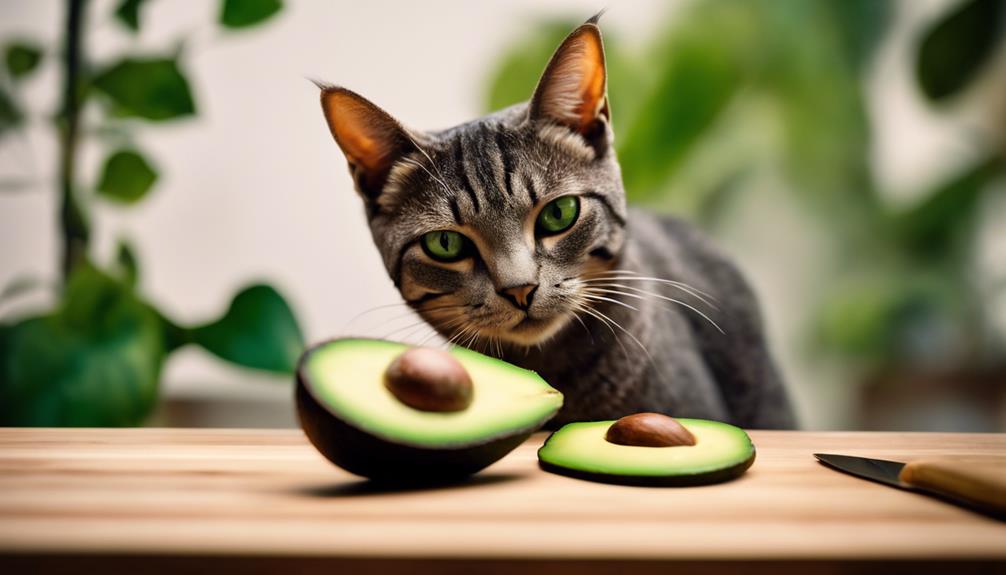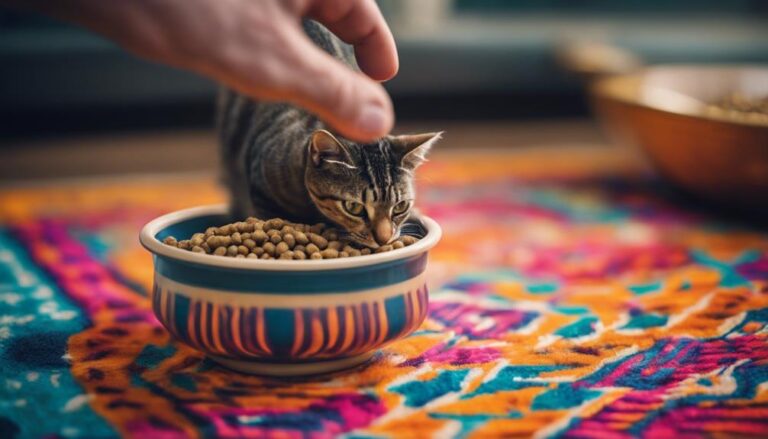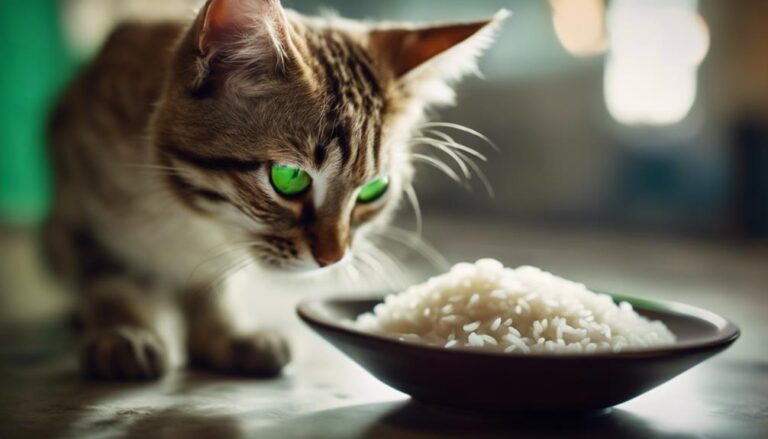If you've ever wondered about adding avocado to your cat's diet, it's essential to pause and reconsider. While avocado might seem like a trendy superfood for humans, its potential effects on feline health are a different story. Before making any dietary decisions for your cat, it's crucial to understand the risks involved and explore safer alternatives to ensure your furry friend's well-being. So, when it comes to cats and avocado, what do you need to know to make informed choices for your pet?
Risks of Avocado for Cats
Avoiding avocado in your cat's diet is crucial due to the potential risks associated with its consumption. Avocado contains a toxin called persin, primarily found in the skin, pit, and leaves, making it toxic to cats. Consumption of large quantities of avocado can lead to various health issues in cats, including gastrointestinal problems and pancreatitis. Cats with a history of pancreatitis or gastritis should steer clear of avocado due to the potential risks involved.
The ingestion of avocado by cats can result in symptoms such as vomiting, diarrhea, abdominal pain, difficulty breathing, and weakness. It's essential to be vigilant and seek immediate veterinary care if your cat exhibits any signs of avocado toxicity to prevent serious complications. Therefore, it's best to play it safe and keep avocado out of your feline friend's reach to safeguard their well-being.
Symptoms of Avocado Toxicity
If your cat consumes avocado, watch out for signs like vomiting, diarrhea, and lethargy.
Breathing issues and abdominal pain are also warning signals of avocado toxicity in cats.
Avocado Toxicity Signs
Upon ingestion of avocado, cats may exhibit symptoms of toxicity such as vomiting and diarrhea. If your furry friend consumes avocado, watch out for these signs:
- Vomiting and diarrhea
- Breathing difficulties and fever
- Abdominal pain and pancreatitis
If you notice any of these symptoms in your cat after avocado ingestion, it's crucial to contact your vet immediately for guidance and treatment. Remember, avocado can pose serious health risks to your cat, so it's best to keep this fruit out of their reach to prevent any potential harm. Always prioritize your cat's well-being and seek professional help when needed.
Cat Avocado Dangers
Toxicity from avocados poses serious risks to your cat, with symptoms including vomiting, diarrhea, and breathing difficulties. Avocado contains a toxin called persin, which is toxic to cats, mainly present in the skin, leaves, and pit.
Consumption of avocados can lead to various health issues in cats, such as gastrointestinal problems and pancreatitis. Additionally, the pits of avocados can present a choking hazard to cats.
If you notice any signs of avocado poisoning in your cat, such as lethargy, weakness, or abdominal pain, it's crucial to seek immediate veterinary care. Being aware of the dangers of avocados and ensuring they're kept away from your feline friend can help prevent any potential harm.
Avocado Poison Symptoms
Avocado poisoning symptoms in cats can manifest as vomiting and diarrhea, indicating potential toxicity that requires immediate attention. If your feline friend ingests avocado, watch out for the following symptoms:
- Coughing
- Difficulty breathing
- Pancreatitis
These signs could signal a severe reaction to avocado consumption in cats. Remember, it's crucial to act swiftly if you notice any of these symptoms in your pet.
Seeking veterinary care promptly can help mitigate the effects of avocado poisoning and ensure your cat's well-being. Be proactive in addressing any concerns related to avocado toxicity to safeguard your cat's health.
Avocado Alternatives for Cats
When considering alternatives to avocado for your cat's diet, explore safe options like meat-based proteins, cooked carrots, green beans, blueberries, and cantaloupe.
While avocado oil can be a safe alternative for cats in small amounts, consult your vet first to ensure it's suitable for their diet. Avocado oil offers benefits similar to avocado flesh but contains lower levels of persin, making it potentially safer. It can be used topically to enhance your cat's fur and coat health.
Remember to stick to safe alternatives like meat-based proteins, which are essential for your cat's diet. Cooked carrots provide a healthy snack option, while green beans offer fiber and nutrients. Blueberries are a tasty treat rich in antioxidants, and cantaloupe can be a refreshing addition to your cat's diet.
Avocado Oil and Cats
Consider incorporating avocado oil into your cat's diet as a potential alternative with benefits similar to avocado flesh. Avocado oil can be given to cats in small amounts, offering a safer option due to lower persin levels compared to other parts of the avocado.
Before introducing avocado oil to your cat, it's crucial to consult a vet for proper guidance. Additionally, avocado oil can be used topically to enhance the fur and coat of your feline friend. Some safe alternatives to avocado for cats include meat-based proteins, cooked carrots, green beans, blueberries, and cantaloupe.
Managing Avocado Exposure in Cats
To keep your cat safe, remember to keep avocado pits, skin, and leaves out of their reach to prevent accidental ingestion.
Consult your veterinarian if you have any concerns about including avocado or avocado oil in your cat's diet.
Watch for symptoms like vomiting, diarrhea, or lethargy that could indicate avocado poisoning in your cat.
Avocado Toxicity Risks
Avocado toxicity risks in cats can be effectively managed by controlling their exposure to this fruit, particularly by limiting their intake and avoiding the skin, pits, or leaves. To manage avocado exposure in your cat, consider the following:
- Limit Intake: Keep avocado consumption to a tablespoon (15 grams) to reduce the risk of adverse reactions.
- Avoid Skin, Pits, and Leaves: Prevent access to these parts of the avocado, which contain higher levels of persin toxin.
- Watch for Symptoms: Monitor your cat for signs of gastrointestinal issues, allergic reactions, or other potential health issues post-avocado consumption.
Symptoms and Treatment
If your cat displays symptoms of avocado poisoning, prompt veterinary intervention is crucial for their well-being. Avocado poisoning in cats can manifest as vomiting, diarrhea, coughing, breathing difficulties, and fever.
Ingesting avocado can also lead to severe conditions like pancreatitis and abdominal pain in cats. Immediate veterinary care is necessary if you suspect your cat has been exposed to avocado. Treatment for avocado ingestion in cats typically involves supportive care, close monitoring, and managing the symptoms.
Remember to steer clear of feeding avocados to your feline companion and ensure they can't access any part of the avocado to prevent toxicity. Prioritize your cat's health by seeking prompt veterinary attention in cases of avocado exposure.
Cat-Safe Nutritional Options
When considering cat-safe nutritional options, prioritize protein-based cat food to meet your feline friend's specific dietary needs.
Here are some safe alternatives to avocados and avocado-containing foods:
- Meat-based Proteins: Opt for high-quality cat food that contains meat as the primary ingredient to ensure your cat receives essential nutrients like taurine.
- Cooked Vegetables: Cooked veggies like carrots or green beans can offer a source of fiber and additional vitamins to complement your cat's diet.
- Fruits in Moderation: While some fruits like avocados are harmful, small amounts of cat-safe fruits like blueberries or watermelon can be a tasty and healthy treat for your pet.
Remember to consult with a vet to ensure you're providing a balanced and nutritious diet for your cat while avoiding potential toxins like avocados.
Prioritizing your cat's health through proper nutrition is key to ensuring a happy and thriving feline companion.
Frequently Asked Questions
What Happens if a Cat Eats Avocado?
Eating avocado can be harmful to your cat. It may cause vomiting, diarrhea, and other digestive issues. Avocado skin, leaves, and pit contain a toxin called persin. If your cat ingests avocado, seek immediate veterinary assistance.
Is Persin Toxic to Cats?
Eating avocado is harmful for cats as persin, a toxin in avocados, can cause health issues like gastrointestinal problems and allergic reactions. Avoid feeding your feline friend avocados to keep them healthy and safe.
Is Avocado Good for Pets?
Avocado is not recommended for pets. It can be harmful due to the toxin persin. Stick to pet-specific foods to keep your furry friend safe and healthy. Avoid avocado to prevent potential health issues.
What Human Foods Can Cats Eat?
Cats can safely enjoy certain human foods in moderation, like cooked lean meats, small amounts of fruits like bananas, and vegetables such as steamed carrots. Always consult your vet to ensure your cat's diet stays healthy and balanced.






